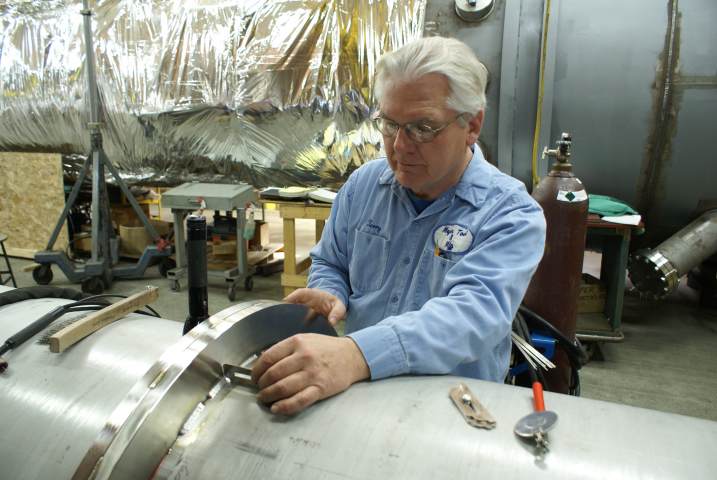The Effect of Extensive Welding Inspection on Sector Specifications: Supporting Safety, Reliability, and Conformity Across Different Sectors
The role of strenuous welding assessment is progressively recognized as a crucial part in enhancing sector criteria, where safety and security, compliance, and reliability take precedence throughout varied markets. What changes might we prepare for in welding methodologies as the demand for high quality and safety and security intensifies?
Significance of Welding Assessments
Acknowledging the important role of welding examinations in keeping top quality and safety criteria, market experts focus on these examinations to guarantee architectural honesty. Welding inspections function as an essential checkpoint in the construction procedure, identifying issues that can jeopardize the sturdiness and safety of welded structures. By systematically assessing welds, assessors can spot concerns such as insufficient penetration, porosity, and cracks, which may not show up to the nude eye.
The importance of these evaluations extends past plain compliance; they are crucial for securing lives and safeguarding financial investments. In essential sectors such as construction, aerospace, and manufacturing, a single damaged weld can cause catastrophic failings, causing both economic loss and human casualties. Consequently, implementing extensive evaluation procedures minimizes these threats and enhances total task integrity.
Moreover, consistent welding assessments foster a culture of high quality throughout companies, encouraging welders to follow ideal techniques and maintain high standards in their job. This dedication to top quality not only boosts functional efficiency but likewise strengthens the track record of business within their particular industries. Thus, welding evaluations are vital in promoting safety and security, dependability, and compliance throughout different markets.
Secret Market Standards and Regulations
The framework of welding inspections is underpinned by a durable collection of market criteria and policies that regulate practices across numerous markets. Trick institutions, such as the American Welding Culture (AWS) and the International Company for Standardization (ISO), develop standards that guarantee high quality and security in welding procedures. As an example, AWS D1.1 describes vital demands for welding steel frameworks, while ISO 3834 defines quality demands for blend welding.
In enhancement to these details requirements, industry policies like the American National Specification Institute (ANSI) and Occupational Safety And Security and Wellness Management (OSHA) requireds better improve conformity by setting safety procedures and operational ideal methods. These guidelines are essential in industries such as aerospace, production, and building and construction, where welding stability is vital.
Furthermore, sector-specific standards, such as those from the American Society of Mechanical Designers (ASME) for stress vessels, supply extra layers of scrutiny to make certain that welds meet stringent safety and security and performance standards. Adherence to these requirements not only facilitates regulative compliance but also cultivates a culture of quality and integrity throughout the welding market, inevitably protecting public well-being and boosting functional performance.

Benefits of Compliance and Reliability
Continually adhering to market standards and policies in welding assessments yields considerable benefits, boosting total dependability and efficiency. The primary benefit is the assurance of high quality in bonded joints, which straight contributes to the safety and security of frameworks and equipment. Compliance with established requirements lessens the threat of failing and catastrophic events, thus shielding both human life and useful properties.
Additionally, organizations that prioritize extensive welding evaluations foster a culture of responsibility and expertise. This dedication not only reinforces the reputation of the firm however also imparts confidence in customers and stakeholders relating to the integrity of items and solutions. Trusted welding processes cause decreased costs related to rework, repair services, and prospective legal liabilities coming from subpar workmanship.
Furthermore, preserving conformity with market standards helps with smoother regulative communications, as organizations can readily show adherence to needed protocols (Welding Inspection Gilbert Arizona). This positive technique can result in advantageous partnerships and chances within the industry, along with accessibility to new markets
Challenges in Welding Evaluation
Browsing the intricacies of welding evaluation offers a myriad of challenges that can hinder compliance with market requirements. The absence of standardized training for examiners can result in different interpretations of assessment requirements, which might jeopardize safety and integrity.
Another challenge depends on the availability of sophisticated inspection devices - Welding Inspection Gilbert Arizona. While innovations such as ultrasonic screening and radiography can boost detection capabilities, their application may be restricted by expense or accessibility, specifically in smaller operations. This disparity can cause a reliance on much less effective examination approaches, increasing the risk of unnoticed problems
Furthermore, the fast-paced nature of modern-day manufacturing typically stress inspectors to prioritize rate over thoroughness, possibly neglecting crucial flaws. Finally, regulative compliance can be discouraging as a result of the evolving nature of sector requirements, leaving companies having a hard time to stay up to date with the most up to date requirements. These challenges necessitate continuous renovation in inspection techniques to make sure the integrity of bonded frameworks across different fields.
Future Trends in Welding Practices
Emerging innovations and advancing approaches are set to transform welding practices in the coming years. Innovations in automation, such as robot welding systems, are acquiring traction, enhancing precision and performance while reducing human mistake. These systems will not just speed up production but likewise assist in regular quality control, addressing a few of the difficulties dealt with in hand-operated welding.
In addition, the combination visit site of expert system (AI) and equipment discovering into welding processes is poised to revolutionize assessment and surveillance. Real-time data analytics will certainly enable anticipating upkeep, enabling aggressive interventions that lower downtime and increase security. In addition, increased truth (AR) and digital fact (VR) technologies are becoming critical in training welders, giving immersive experiences that enhance ability advancement without the risks linked with standard approaches.
Sustainability is likewise a vital trend, as industries look for greener methods. The adoption of environmentally friendly materials and approaches, along with energy-efficient equipment, will click to read more likely come to be basic. As industries adapt to these modifications, the focus will certainly move toward better compliance with safety and environmental laws, making certain that welding practices not just satisfy existing standards but also lead the way for a more secure and even more sustainable future.

Conclusion
In verdict, extensive welding evaluations considerably enhance market requirements by guaranteeing safety and security, dependability, and compliance throughout various sectors. As markets proceed to focus on functional integrity, the value of extensive inspections will just boost, inevitably benefiting services and society at huge.
The role of extensive welding inspection is significantly identified as an important element in enhancing industry requirements, where safety and security, compliance, and reliability take priority across diverse fields. Hence, welding inspections are crucial in promoting security, reliability, and compliance throughout various sectors.
Key organizations, such as the American Welding Culture (AWS) and the International Organization for Standardization (ISO), establish guidelines that guarantee high quality and safety and security in welding procedures. AWS D1.1 click here to find out more details important demands for welding steel frameworks, while ISO 3834 defines top quality requirements for combination welding.
In verdict, rigorous welding evaluations considerably enhance sector standards by ensuring safety, integrity, and conformity across various sectors.